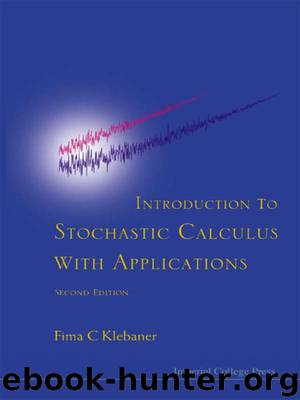Introduction to Stochastic Calculus With Applications: Second Edition by Fima C Klebaner

Author:Fima C Klebaner
Language: eng
Format: epub
Publisher: Imperial College Press
Thus we have shown that when p ≥ 1/2 any positive state will be reached from 0 in a finite time, but when p = 1/2 the average time for it to happen is infinite.
The results obtained above are known as transience (p ≠ 1/2) and recurrence (p = 1/2) of the Random Walk, and are usually obtained by Markov Chains Theory.
Example 7.9: (Optional stopping of discrete time martingales)
Let M(t) be a discrete time martingale and be a stopping time such that E|M()| < ∞.
1. If E < ∞ and |M(t + 1) − M(t)| ≤ K, then EM() = EM(0).
2. If E < ∞ and E(|M(t + 1) − M(t)||Ft) ≤ K, then EM() = EM(0).
PROOF: We prove the first statement.
M(t) = M(0)|+ (M(i+1) − M(i)). This together with the bound on increments gives
M(t) ≤ |M(0)| +|M(i + 1) − M(i)| ≤ |M(0)| + Kt.
Take for simplicity non-random M(0) Then
EM(t)I( > t) ≤ |M(0)|P( > t) + KtP( > t).
The last term converges to zero, tP( > t) ≤ E( I( > t)) → 0, by dominated convergence due to E( ) < ∞. Thus condition (7.8) holds, and the result follows. The proof of the second statement is similar and is left as an exercise.
Download
This site does not store any files on its server. We only index and link to content provided by other sites. Please contact the content providers to delete copyright contents if any and email us, we'll remove relevant links or contents immediately.
What's Done in Darkness by Kayla Perrin(26500)
Shot Through the Heart: DI Grace Fisher 2 by Isabelle Grey(18992)
The Fifty Shades Trilogy & Grey by E L James(18933)
Shot Through the Heart by Mercy Celeste(18871)
Wolf & Parchment: New Theory Spice & Wolf, Vol. 10 by Isuna Hasekura and Jyuu Ayakura(16959)
Python GUI Applications using PyQt5 : The hands-on guide to build apps with Python by Verdugo Leire(16852)
Peren F. Statistics for Business and Economics...Essential Formulas 3ed 2025 by Unknown(16785)
Wolf & Parchment: New Theory Spice & Wolf, Vol. 03 by Isuna Hasekura and Jyuu Ayakura & Jyuu Ayakura(16673)
Wolf & Parchment: New Theory Spice & Wolf, Vol. 01 by Isuna Hasekura and Jyuu Ayakura & Jyuu Ayakura(16300)
The Subtle Art of Not Giving a F*ck by Mark Manson(14240)
The 3rd Cycle of the Betrayed Series Collection: Extremely Controversial Historical Thrillers (Betrayed Series Boxed set) by McCray Carolyn(14056)
Stepbrother Stories 2 - 21 Taboo Story Collection (Brother Sister Stepbrother Stepsister Taboo Pseudo Incest Family Virgin Creampie Pregnant Forced Pregnancy Breeding) by Roxi Harding(13384)
Scorched Earth by Nick Kyme(12700)
Drei Generationen auf dem Jakobsweg by Stein Pia(10906)
Suna by Ziefle Pia(10837)
Scythe by Neal Shusterman(10253)
International Relations from the Global South; Worlds of Difference; First Edition by Arlene B. Tickner & Karen Smith(9465)
Successful Proposal Strategies for Small Businesses: Using Knowledge Management ot Win Govenment, Private Sector, and International Contracts 3rd Edition by Robert Frey(9304)
This is Going to Hurt by Adam Kay(9076)
